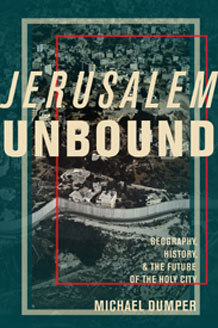articles

Mick Dumper is the author of Jerusalem Unbound which plots the history and examines the underlying factors that make a peace agreement between Israel and the Palestinians so difficult.
New award for study of conflict in Holy Cities.
Professor Mick Dumper has been awarded a 3 year Major Research Fellowship by the Leverhulme Foundation to study how conflicts arise and are managed in holy cities in different parts of the world. Commencing in September 2015, the project project will draw on empirical research previously carried out in Belfast, Mostar, Nicosia, Beirut and Jerusalem, but will this time focus on the “holiness” of a city in order to explore the relationship between the religious features of a city and the conflicts that occur in them. Target cities include Lhasa, Kyoto, Varanasi, Najaf and Rome where religion plays a dominant role in urban development. These cities are characterised by particular forms of land use and property ownership, the acting out of public rituals such as services and processions, certain types of employment and significant monumental construction in the form of holy sites. However, can one define a city’s holiness simply by the number of holy sites located within its limits? Is there a relationship between the proportion of holy sites to land area or to population that defines its holiness, or should it be based on something else? One of the tasks of this project, therefore, is to develop a working definition of a holy city so that the kinds of conflict they exhibit can be contextualised and studied in a more systematic manner.
As a result of his previous research work on Jerusalem in particular, Professor Dumper became regularly involved in advisory work for actors concerned in the Middle East peace process, such as the UN, the European Commission, and a number of governments including the FCO and US and for various European and North American think-tanks. Such work encompassed three ESRC awards, which, beginning in 2002, became known as the Conflict in Cities and the Contested State project and led to the publication of Jerusalem Unbound: Geography, History and the Future of the Holy City (Columbia University Press, 2014)
